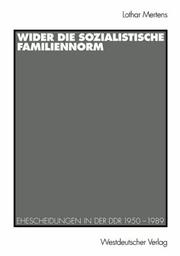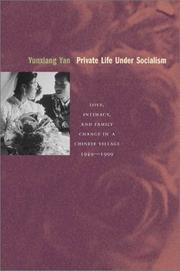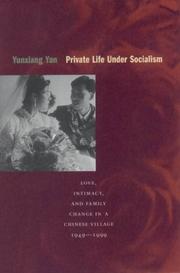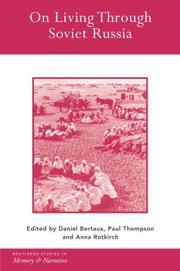| Listing 1 - 5 of 5 |
Sort by
|

ISBN: 3531133101 9783531133102 Year: 1998 Publisher: Wiesbaden Westdeutscher Verlag
Abstract | Keywords | Export | Availability | Bookmark
 Loading...
Loading...Choose an application
- Reference Manager
- EndNote
- RefWorks (Direct export to RefWorks)
Divorce --- Families --- Communism and families --- Marriage --- Broken homes --- Divorced people --- Communism and family --- Families and communism

ISBN: 9781417501367 0804764115 1417501367 9781417501366 0804733090 9780804733090 0804744564 9780804744560 Year: 2003 Publisher: Stanford, Calif. Stanford University Press
Abstract | Keywords | Export | Availability | Bookmark
 Loading...
Loading...Choose an application
- Reference Manager
- EndNote
- RefWorks (Direct export to RefWorks)
For seven years in the 1970s, the author lived in a village in northeast China as an ordinary farmer. In 1989, he returned to the village as an anthropologist to begin the unparalleled span of eleven years’ fieldwork that has resulted in this book—a comprehensive, vivid, and nuanced account of family change and the transformation of private life in rural China from 1949 to 1999. The author’s focus on the personal and the emotional sets this book apart from most studies of the Chinese family. Yan explores private lives to examine areas of family life that have been largely overlooked, such as emotion, desire, intimacy, privacy, conjugality, and individuality. He concludes that the past five decades have witnessed a dual transformation of private life: the rise of the private family, within which the private lives of individual women and men are thriving.
Families --- Marriage --- Intergenerational relations --- Courtship --- Communism and families --- Communism and family --- Families and communism --- Courting --- Wooing --- Betrothal --- Love --- Love-letters --- Intergenerational relationships --- Relations, Intergenerational --- Relationships, Intergenerational --- Interpersonal relations --- Married life --- Matrimony --- Nuptiality --- Wedlock --- Sacraments --- Home --- Honeymoons --- Family --- Family life --- Family relationships --- Family structure --- Relationships, Family --- Structure, Family --- Social institutions --- Birth order --- Domestic relations --- Households --- Kinship --- Matriarchy --- Parenthood --- Patriarchy --- Social aspects --- Social conditions --- Xiajia (Heilongjiang Sheng, China) --- Xiajia Village (Heilongjiang Sheng, China) --- Social life and customs
Book
ISBN: 9781839767197 1839767197 9781839767210 9781839767203 Year: 2022 Publisher: London Verso
Abstract | Keywords | Export | Availability | Bookmark
 Loading...
Loading...Choose an application
- Reference Manager
- EndNote
- RefWorks (Direct export to RefWorks)
"We need to talk about the family. For those who are lucky, families can be filled with love and care, but for many they are sites of pain: from abandonment and neglect, to abuse and violence. Nobody is more likely to harm you than your family. Even in so-called happy families, the unpaid, unacknowledged work that it takes to raise children and care for each other is endless and exhausting. It could be otherwise: in this urgent, incisive polemic, leading feminist critic Sophie Lewis makes the case for family abolition. Abolish the Family traces the history of family abolitionist demands, beginning with nineteenth century utopian socialist and sex radical Charles Fourier, the Communist Manifesto and early-twentieth century Russian family abolitionist Alexandra Kollontai. Turning her attention to the 1960s, Lewis reminds us of the anti-family politics of radical feminists like Shulamith Firestone and the gay liberationists, a tradition she traces to the queer Marxists bringing family abolition to the twenty-first century. This exhilarating essay looks at historic rightwing panic about Black families and the violent imposition of the family on indigenous communities, and insists: only by thinking beyond the family can we begin to imagine what might come after." --inside front cover flap
Families --- Communism and families --- Sociological aspects --- Communism and family --- Families and communism --- Family --- Family life --- Family relationships --- Family structure --- Relationships, Family --- Structure, Family --- Social institutions --- Birth order --- Domestic relations --- Home --- Households --- Kinship --- Marriage --- Matriarchy --- Parenthood --- Patriarchy --- Social aspects --- Social conditions --- Communism and families. --- #SBIB:316.356.2H1130 --- #SBIB:316.346H20 --- #SBIB:39A11 --- Hedendaagse gezinsstudies: algemeen --- Positie van de vrouw in de samenleving: algemeen --- Antropologie : socio-politieke structuren en relaties --- Feminist criticism --- Philosophy --- Radical feminism --- Living arrangements --- Book --- Communism --- Sociology of the family. Sociology of sexuality

ISBN: 0804744564 0804733090 Year: 2003 Publisher: Stanford Stanford University Press
Abstract | Keywords | Export | Availability | Bookmark
 Loading...
Loading...Choose an application
- Reference Manager
- EndNote
- RefWorks (Direct export to RefWorks)
Communism and families --- Courtship --- Families --- Intergenerational relations --- Marriage --- -Intergenerational relations --- -Communism and family --- Communism and family --- Families and communism --- Xiajia (Heilongjiang Sheng, China) --- -Xiajia (Heilongjiang Sheng, China) --- S11/0494 --- S11/0731 --- S11/1050 --- S20/0250 --- China: Social sciences--Society since 1949 --- China: Social sciences--Childhood, youth --- China: Social sciences--Family planning --- China: Agriculture forestry, fishery, natural disasters--General works: since 1949 --- Amours --- Communisme et famille --- Xiajia (Heilongjiang, Chine) --- Married life --- Matrimony --- Nuptiality --- Wedlock --- Love --- Sacraments --- Betrothal --- Home --- Honeymoons --- Intergenerational relationships --- Relations, Intergenerational --- Relationships, Intergenerational --- Interpersonal relations --- Family --- Family life --- Family relationships --- Family structure --- Relationships, Family --- Structure, Family --- Social institutions --- Birth order --- Domestic relations --- Households --- Kinship --- Matriarchy --- Parenthood --- Patriarchy --- Courting --- Wooing --- Love-letters --- Social aspects --- Social conditions --- Xiajia Village (Heilongjiang Sheng, China) --- Social life and customs --- S11/0504 --- S11/0705 --- S11/0730 --- S11/0732 --- S11/0745 --- S11/1070 --- S20/0730 --- China: Social sciences--Daily life: since 1949 --- China: Social sciences--Clan and family: since 1949 --- China: Social sciences--Women: since 1949 --- China: Social sciences--Elderly people --- China: Social sciences--Sexual life: since 1949 --- China: Social sciences--One child policy --- China: Agriculture forestry, fishery, natural disasters--Rural reforms: since 1979 --- Familles --- Mariage --- Relations entre générations --- Moeurs et coutumes --- Famille --- Cour amoureuse --- Relations entre générations --- Conditions sociales --- 20e siècle --- Conditions économiques

ISBN: 113439148X 1280052481 0203410793 9780203410790 0415309662 9781134391431 9781134391479 9781134391486 9780415309660 9780415859967 1134391471 Year: 2004 Publisher: London New York Routledge
Abstract | Keywords | Export | Availability | Bookmark
 Loading...
Loading...Choose an application
- Reference Manager
- EndNote
- RefWorks (Direct export to RefWorks)
For a period of over seventy years after the 1917 revolutions in Russia, talking about the past, either political or personal, became dangerous. The new policy of glasnost at the end of the 1980s resulted in a flood of reminiscence, almost nightly on television and more formally collected by new Russian oral history groups and western researchers. This book is a fascinating collection of life stories and family history interview material collected by the editors and two Russian groups of interviewers.
Communism and families --- Oral history. --- History --- Oral biography --- Oral tradition --- Communism and family --- Families and communism --- Families --- Methodology --- Soviet Union --- Советский Союз --- Ber. ha-M. --- Zwia̦zek Socjalistycznych Republik Radzieckich --- Szovjetunió --- TSRS --- Tarybų Socialistinių Respublikų Sąjunga --- SRSR --- Soi︠u︡z Radi︠a︡nsʹkykh Sot︠s︡ialistychnykh Respublik --- SSSR --- Soi︠u︡z Sovetskikh Sot︠s︡ialisticheskikh Respublik --- UdSSR --- Shūravī --- Ittiḥād-i Jamāhīr-i Ishtirākīyah-i Shūrāʼīyah --- Russia (1923- U.S.S.R.) --- Sovetskiy Soyuz --- Soyuz SSR --- Sovetskiĭ Soi︠u︡z --- Soi︠u︡z SSR --- Uni Sovjet --- Union of Soviet Socialist Republics --- USSR --- SSṚM --- Sovetakan Sotsʻialistakan Ṛespublikaneri Miutʻyun --- SSHM --- Sovetakan Sotsʻialistakan Hanrapetutʻyunneri Miutʻyun --- URSS --- Unión de Repúblicas Socialistas Soviéticas --- Berit ha-Moʻatsot --- Rusyah --- Ittiḥād al-Sūfiyītī --- Rusiyah --- Rusland --- Soṿet-Rusland --- Uni Soviet --- Union soviétique --- Zȯvlȯlt Kholboot Uls --- Związek Radziecki --- ESSD --- Sahaphāp Sōwīat --- KhSHM --- SSR Kavširi --- Russland --- SNTL --- PSRS --- Su-lien --- Sobhieṭ Ẏuniẏana --- FSSR --- Unione Sovietica --- Ittiḥād-i Shūravī --- Soviyat Yūniyan --- Russian S.F.S.R. --- Social conditions --- Social life and customs --- Moral conditions --- Związek Socjalistycznych Republik Radzieckich --- ZSRR --- Związek Socjalistycznych Republik Sowieckich --- ZSRS
| Listing 1 - 5 of 5 |
Sort by
|

 Search
Search Feedback
Feedback About UniCat
About UniCat  Help
Help News
News